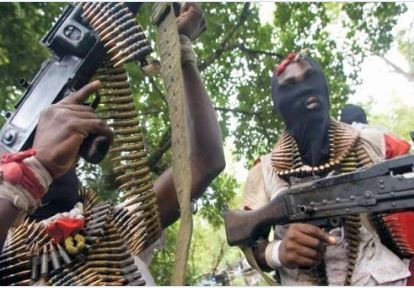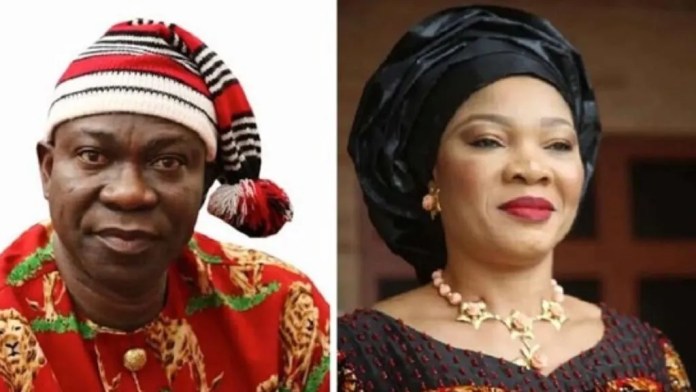President Muhammadu Buhari on Tuesday had a correspondence with Bloomberg, and in that exchange, he had so much to say about the state of affairs in Nigeria.
The President answered several questions ranging from the economy to the security and down to the fight against corruption, with a hint of what his choice would be in the 2023 presidential election.
Below are 27 major things President Buhari said during his interview:
SECURITY
1. We leave Nigeria in a far better place than we found it. Corruption is less hidden for Nigerians feel empowered to report it without fear, while money is returned
2. Terrorists no longer hold any territory in Nigeria, and their leaders are deceased, and vast infrastructure development sets the country on course for sustainable and equitable growth.
3. The jets acquired from the US and intelligence shared by British were not provided to previous administrations and stand as testament to renewed trust re-built between Nigeria and our traditional western allies under my government.
4. We urge those same international partners to take additional steps costing them nothing, by proscribing another group – IPOB – as a terrorist organization.
Their leadership enjoys safe haven in the West, broadcasting hate speech into Nigeria from London, spending millions lobbying members of the US Congress, and freely using international financial networks to arm agitators on the ground. This must stop.
5. My administration is the only one in Nigeria’s history to implement a solution to decades-long herder-farmer conflicts, exacerbated by desertification and demographic growth.
The National Livestock Transformation Plan, putting ranching at its core, is the only way to deplete the competition for resources at the core of the clashes. Governors from some individual states have sought to play politics where ranches have been established, but where they have been disputes have dramatically reduced.
6. We have spent our two terms investing heavily in the national road, rail, and transport infrastructure set to unleash growth, connect communities, and lessen inequality. This is structural transformation. It may not show on standard economic metrics now, but the results will be apparent in good time.
CORRUPTION
7. Starting with our Whistleblowing Policy enacted in my first year in office hundreds of millions in stolen funds have been returned within Nigeria.
8. Working with our international partners, hundreds of millions of various currencies have been returned from abroad – primarily from the UK, US, and Switzerland – and used as social and welfare funds distributed directly to the poorest during the Covid pandemic and the provision of long-delayed infrastructure-roads, bridges, rail, and power.
9. As an illustration, Monetary recoveries (January-December) 2021 show that more than N152 billion has been recovered. Dollar recoveries for the year amount to over USD 386 million; GBP, more than 1.1 million; Euro, about 157,000; Saudi Riyals about 1.7 million some more in Digital and other currencies.
Those partners refused to return these monies held for decades to previous Nigerian administrations in the certainty they would simply be re-stolen. They changed their approach with us because they knew my administration could be trusted.
10. We can only imagine what food inflation would be today had we not initiated organized programmes to boost domestic production. And still, we do not grow enough domestically.
Initiatives such as the Nigeria Anchor Borrower’s programme, helping farmers compete against artificially lowered imports have boosted rice production to 9 million metric tonnes in 2021 from around 5.4 million metric tonnes in 2015. Even in the years of drought, rice production outstripped pre-2015 levels. Imports have fallen to near zero. We are making progress.
ELECTRICITY
11. First, we need more input. Our legislative framework has been a drag. The landmark PIA (see later answers) will bolster input, raise capital, and bring transparency to the system.
12. On grid modernization, there are hundreds of ongoing projects and initiatives attracting funding from investors. Take my Presidential Power Initiative (PPI), a government-to-government initiative between the Governments of Nigeria and Germany, with Siemens AG, to upgrade the electricity grid with a $2 billion investment.
Once signed into law the constitutional amendment bill – recently voted through parliament – will allow state governments to generate and transmit their own electricity, further facilitating investor participation in our market and enabling states and local businesses to transmit excess supply to the grid.
13. We are also decentralizing the national grid through renewable-driven mini-grids. The $550 million Nigeria Electrification Project has deployed more than 20,000 Standalone Solar Systems (SHS), as well as Solar Hybrid mini-grids in over 250 locations.
ECONOMY
14. Most western countries are today implementing fuel subsidies. Why would we remove ours now? What is good for the goose is good for the gander!
What our western allies are learning the hard way is what looks good on paper and the human consequences are two different things.
15. My government set in motion plans to remove the subsidy late last year. After further consultation with stakeholders, and as events unfolded this year, such a move became increasingly untenable.
Boosting internal production for refined products shall also help. Capacity is due to step up markedly later this year and next, as private players and modular refineries (Dangote Refinery, BUA Group Refinery, Waltersmith Refinery) come on board.
16. The exchange rate is still susceptible to external shocks that can suddenly and severely affect Nigerian citizens. As we step up domestic production – both in fuel (enabled by PIA) and food (agricultural policies) – the inflationary threat shall diminish, and we can move toward unification.
17. A narrow focus on debt misses the point. What it fills is Nigeria’s longstanding infrastructure deficit by constructing a foundation for sustainable growth – spreading opportunity to ensure no part of the country is left behind, which has led to insecurity in the past.
18. Our infrastructure developments have been the most ambitious since Nigeria’s independence. Over 800 federal roads are being constructed or undergoing rehabilitation and 650km of rail line have been laid, helping alleviate food inflation pressures, given most food is produced in the north.
Had the infrastructure gap not been filled it will only grow, and become more costly to repair what little we have while lacking more infrastructure on which to build growth, negatively impacting progress towards UN Sustainable Development Goals.
19. Though we have the largest economy in Africa, it is true that translating that wealth into revenue generation is challenging.
20. We raised VAT in 2020, and the IMF wanted us to raise it further, but this is a complex issue that cannot be addressed by tax hikes alone. Around 80% of Nigerians work in the so-called informal economy – a situation exacerbated by the pandemic. It is difficult to tax the informally employed, and no country has yet found an adequate solution.
Still, we are striving to find one, including the roll out of a national ID card which has grown from 7 million in 2015 to between 90-100 million today – including a tax code and, at the same time combined with access to various government services.
21. On 1st July the NNPC will become a Limited Liability Company and be subject to more robust auditing and commercial disclosure obligations. It will help stimulate investment and boost transparency, where corruption has deterred the former and stymied the latter. My administration is the first to pass this landmark reform our oil and gas sector, after two decades of predecessors’ failure to do so – no doubt due to vested interests.
22. Criminality and terrorism in oil-producing regions hamper production, and it would help if our western allies designated IPOB as a terrorist group, given their complicity in damage to pipelines and infrastructure.
23. We have invested in our security forces, including the $1 billion military deal with the U.S. for the acquisition of A-29 Super Tucano aircraft. These efforts are making an impact: wells that had to be closed due to criminality have now re-opened. With these efforts, OPEC has raised our quota for next month.
24. We need long-term partnership not inconsistency and contradiction on green energy policy from the UK and European Union. Investment is hampered by their broad-brush moratorium on overseas gas projects, while at home the same projects are classified as green. It does not help their energy security, it does not help Nigeria’s economy, and it does not help the environment. It is hypocrisy that must end.
To change, the UK and EU countries should invest in our planned 4000 km pipeline to bring Nigerian gas – the largest reserves in Africa – via Morocco, then onto Europe.
EMEFIELE’S AMBITION
25. The CBN governor is appointed by the President. But this appointment is subject to confirmation by the Nigerian Senate. Ultimately, it will be for the CBN’s board of directors to determine whether a CBN governor’s actions have fallen foul of the laws in place to ensure he can most effectively carry out his duties.
26. African nations make up the largest contingent of Commonwealth members. There is no reason why one of the world’s foremost arms manufacturers should not sell more widely to this club – a group of allies.
If they don’t get them from Britain, they shall necessarily get them from elsewhere. This only creates a mosaic of different systems across Commonwealth members on the continent.
Commonwealth members in Africa often find themselves in the same missions, operating with the same hardware and systems, collaborating troops would be more effective. Such collaboration could also open doors to deeper intelligence sharing.
BLASPHEMY
27. No person has the right to take the law into his or her own hands. Christianity and Islam, our two Great Faiths and their Great Books have far more in common than they have apart. Nigeria has a long tradition of tolerance that we must draw on, and we must strive to find common ground. What comes out of this tragedy is to cherish what we share, while at the same time respecting our differences





